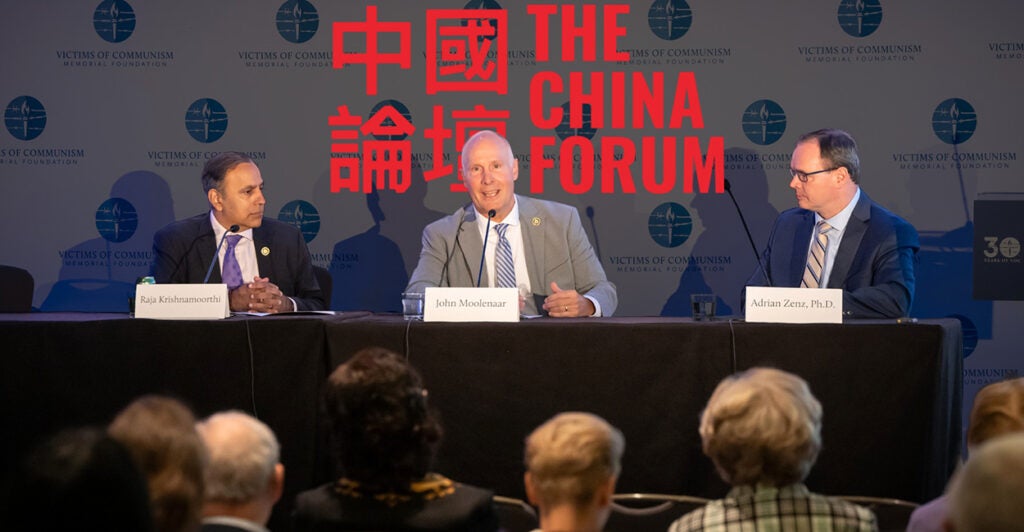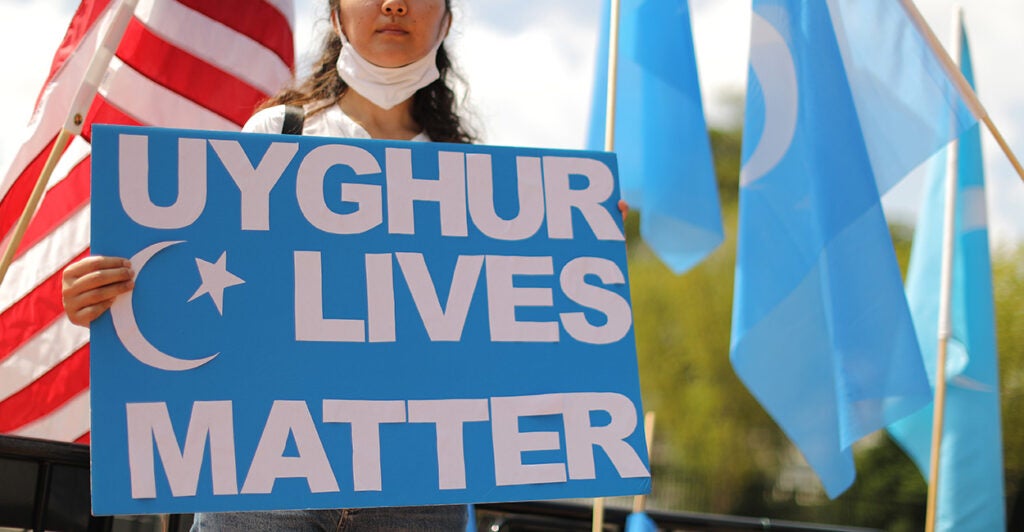As a child, Muetter Iliqud fled China seeking a life of freedom. She had little choice, given her religion as a Uyghur—a largely Muslim minority group persecuted by the Chinese Communist Party.
Now a researcher at the Victims of Communism Memorial Foundation, Iliqud dedicates much of her time to uncovering the “systematic repression” of her people, she said during The China Forum, a recent annual event sponsored by the foundation.
Exposing the crimes of the Chinese Communist Party against Uyghurs is an ongoing fight, because Uyghurs as well as Chinese citizens in general “live in fear of the midnight knock,” in the words of author and Asian studies professor David Shambaugh, a keynote speaker at The China Forum.
“The midnight knock” is the dreaded sound that dissidents and religious minorities such as Uyghurs fear under the “extreme techno-Orwellian surveillance state” of modern China, as Shambaugh, also a fellow at the Hoover Institution, said.
Testimonials from survivors of “the midnight knock” are few, as many are sent to CCP-sponsored forced labor camps in the Xinjiang region of northwest China.
Iliqud said those fortunate enough to have survived the labor camps can’t recall much concrete detail to expose the locations of the camps, as they were cloaked in “black hoods” upon arrival and imprisonment.
Shambaugh said Chinese leader Xi Jinping and the ruling CCP “see demons and enemies everywhere.”
Mark Green, president and CEO of the Woodrow Wilson International Center for Scholars, said that those standing for the causes discussed at The China Forum are “on the side of the angels.”

Telling the Story
The China Forum, held Sept. 24 and 25 at the Mayflower Hotel, brought together over 25 expert panelists, dozens of attendees, and over 9,000 online viewers. It was the 10th annual event hosted by the Victims of Communism Memorial Foundation.
The China Forum promoted what Green called a “human-centric message.” Its website states that the forum’s goal is to “help Americans understand the nature of the … Chinese Communist Party (CCP) and key issues in U.S.-China relations.”
One issue that drew a bipartisan selection of panelists is what the U.S. State Department defined in a 2021 report as the Chinese government’s “genocide … and crimes against humanity including imprisonment, torture, enforced sterilization, and persecution against Uyghurs.”
Speakers sought to “blow the whistle and tell the story,” as Green put it, asserting that “sunlight and transparency” are the keys to “promoting human dignity.”
“This is what genocide looks like,” Rep. Raja Krishnamoorthi, D-Ill., said during a day of panel discussions Sept. 25. “It is my opinion that what is going on in Xinjiang is an intentional effort to disappear the Uyghur people over time.”
Krishnamoorthi referenced China’s forced sterilization of hundreds of thousands of Uyghur women, the 2 million Uyghurs confined to internment camps, and the declining birth rate of Uyghurs over the past 10 years.
The Uyghur people are a Turkish minority group who are predominantly Muslim. Up to 2 million Uyghurs and other ethnic minorities have been detained in “reeducation” camps in Xinjiang since 2017.
“In addition to the Uyghur language, there are other markers that constitute Uyghur identity, such as the Islamic faith, Uyghur culture, Uyghur artistry, Uyghur music, and so on, all of which have been under attack,” Efran A. Uyghur and Erkin Kainat write in a book in the Uyghur Transitional Justice Database titled “Remolding the Uyghurs to Fit the Han-ethnocentric Mold.”
The Han Chinese are the majority ethnic group in China.
Why China Targets Uyghurs
“If you are not a Han Chinese communist, then you are ‘less than’ in Xi Jinping’s CCP-dominated China,” Morse Tan, former U.S. ambassador-at-large for global criminal justice, said during one panel at The China Forum.
Tan added that “all manners of crimes against humanity … are being perpetrated in these reeducation centers. Whether it’s slavery, sexual crimes, torture, or extermination.”
He also pointed to forced sterilization and abortions, stating that “over 80% of IUDs [are] being implanted in Uyghur and other Turkic minority women in Xinjiang province, when they make up less than 2% of the [Chinese] population.”
This is “only the seventh time in U.S. history that the government did a human atrocity investigation,” Tan noted.
“China sees them as a threat to its control,” said Michael Cunningham, a research fellow specializing in China at The Heritage Foundation’s Asian Studies Center, referring to the Uyghurs and other ethnic minorities.
Two things motivate China’s human rights violations, Cunningham told The Daily Signal.
The first is that the Uyghurs have unique linguistic, cultural, and religious ties, which are seen as a threat to a ruling party that is paranoid about the possible emergence of rival power centers it doesn’t control.
Cunningham said that “even back as early as the 1950s, the Chinese Communist Party has had a government-sponsored mass migration of Han Chinese people … to Xinjiang for the purpose of solidifying their control over the region.”
Cunningham also said that part of the CCP’s “claim to legitimacy” is that the party improves “the security and safety of the majority of the Chinese people.”
Holding the US Accountable
Cunningham pointed to a “small number of violent incidents [involving] certain Uyghur pro-independence groups as recently as about a decade ago” that formed the party’s stated rationale to “get rid of extremists, separatists, terrorists.”
Those attacks were probably reactions to China’s “oppressive policies” in Xinjiang, Cunningham said. But from the CCP’s perspective, maintaining the image that the party not only can prosecute violence but prevent it from happening in the first place is worth the cost of “completely demolishing another minority,” he said.
At one point, Iliqud asserted that “a culture of silence” developed among her fellow Uyghurs in China out of fear for their families’ lives.
Panelists had strong warnings and recommendations for the United States on the issue of Uyghur persecution in China.
Rep. John Moolenaar, R-Mich., argued that the U.S. economy “is benefiting from what is happening there” in Xinjiang.
His Democratic colleague, Krishnamoorthi, agreed that “we’re enabling this situation as the American people.”
“The U.S. government has gone silent on Xinjiang,” Eric Patterson, president and CEO of the Victims of Communism Memorial Foundation, said.
Although Moolenaar said the U.S. must end its reliance on forced labor overseas, Olivia Enos, a senior fellow at the Hudson Institute, pointed to potential sanctions as solutions.
“The Biden administration, to my knowledge, has not issued a single sanction under the Uyghur Human Rights Policy Act on forced-labor grounds, which is a huge oversight,” Enos said.
That 2020 law says it was designed to “condemn gross human rights violations of ethnic Turkic Muslims in Xinjiang.”
However, the absence of sanctions in the law means that “the tools in the toolkit have been underutilized,” Enos said.
(Her full report on how policymakers may strengthen implementation of the Uyghur Forced Labor Prevention Act is available on the Hudson Institute’s website.)
“Governments are capable of prosecuting serious human rights crimes,” said Sophie Richardson, former China director for Human Rights Watch, noting that many Western nations have investigated, prosecuted, or dismissed charges beyond their borders.
“Why not China?” Richardson asked. “This is a community that deserves justice.”
